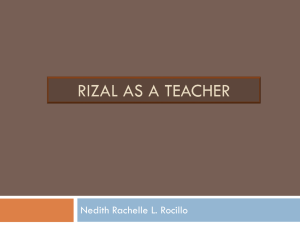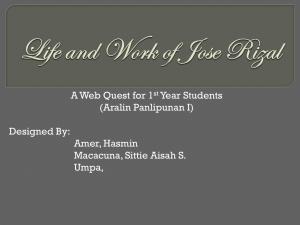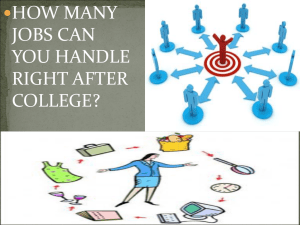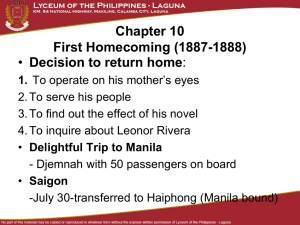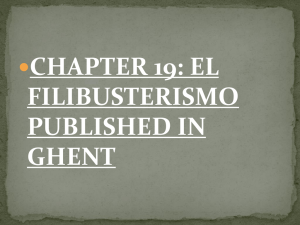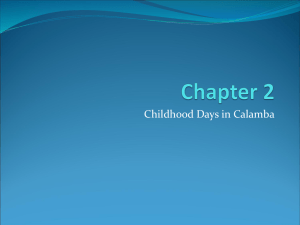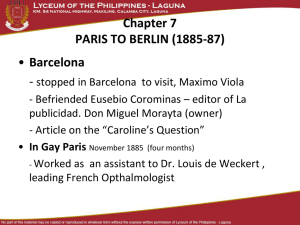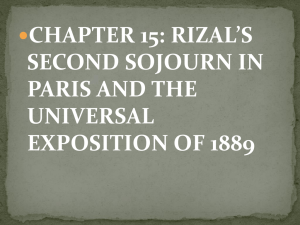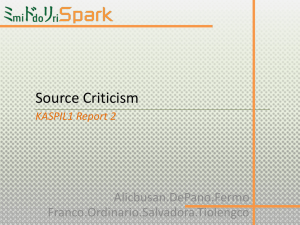Veneration with Understanding
advertisement
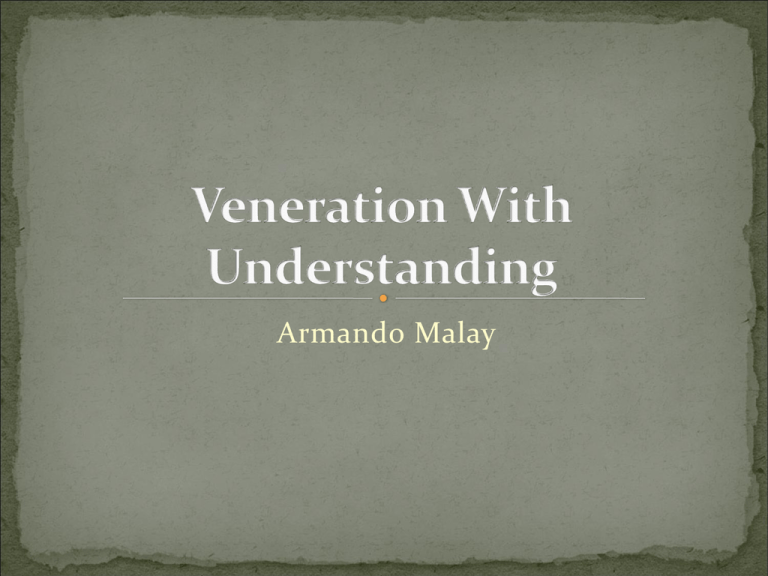
Armando Malay
Si Armando J. Malay ay
isa sa mga
pinakatinitingalang
journalist sa bansa.
Maliban sa pagiging
isang peryodista, isa
din syang propesor at
tagasulong ng press
freedom lalo na nung
Martial Law.
“The wounds that had
been inflicted by
foreigners were
painful, but more
painful are the wounds
still being inflicted on
his memory by his
own countrymen.”
The main argument of
the home-grown
detractors of Rizal is this:
Since Rizal did not lead
the revolution of 1896 –
he even discouraged
and disowned it – he
could not be properly the
national hero of the
Philippines.
Two minor themes have been put forward by Rizal’s
made-in-the Philippines critics:
*Rizal’s becoming the national hero was the result of
American sponsorship
*Rizal’s patriotic works, including his two novels,
reflected his mestizo or ilustrado background and
were taken precisely to protect the interests of the
ilustrado class.
Since Rizal, despite the
fact that he is a false
hero, continues to be
venerated by Filipinos,
then that veneration is
misplaced and that if
his countrymen only
“understood” Rizal’s
motivation, they would
drop him like a hot
potato.
“I would like to develop the
opposite thesis: Continued
veneration of Rizal by the
country, and even by the world,
is not only deserved but also
understood.”
“Almost always, national
heroes of the world
have been
revolutionary heroes.
If you do not lead a
revolution, your
chance of emerging a s
a national hero is nil –
or very little.”
“I beg to disagree…Out
of 125 nations [in the
roster of United
Nations}, Constantino
could only name seven
revolutionary heroes
who, in his opinion,
have become national
heroes…Very clearly, a
mere seven out of 125 is
a very small minority.”
“A man becomes a hero,
or a national hero, not
because he leads a
revolution – but because
he is admired for his
achievements and noble
qualities, and considered
a model or ideal.”
“I suppose he
{Constantino} would
rule out India’s
Mahatma Gandhi.
Gandhi led no armies,
but he did more than
all the military leaders
of India put together
to achieve nationhood
for India.”
“Constantino failed to
list Sukarno of
Indonesia.
Indonesians should
automatically regard
Sukarno as the
national hero. But they
don’t because some of
his actuations have
been placed under a
cloud.”
“I question
Constantino’s
inclusion of
Washington as the
national hero of the
United States
…Washington came
from the landed
gentry, owning vast
tracts of land and
keeping slaves.”
“One of Constantino’s gripes against Rizal’s being
the national hero is that the latter did not come
from the masses whose aspirations did not
sympathize with. We could say the same way with
regards to Washington (perhaps even worse
because Rizal did not hold slaves), yet he made
Constantino’s list and Rizal would not.”
“A man becomes a
hero, or a national
hero, if he
accomplishes
achievements that his
people would admire
so much that they
would place him in
higher regard than any
other man in the
country…
…That achievement
may be in the
revolutionary
field, the field of
statesmanship and
music, and in the
future, it might be in
the scientific or
economic fields.”
“The field is not
limited to the field of
revolution. Maybe, in
some new African
nation, the
national hero would be
one who invents a
vaccine that would
forever banish a
debilitating disease.”
“My quarrel with
Constantino is this: He setup the criterion of
‘revolutionary leadership’
as the one that would govern
the choice of a national hero
– and since he did not join
the revolution of 1896 but
even repudiated it, he could
not qualify.”
“Since Rizal continues to
be venerated by his
people, despite the
shortcomings described
by Constantino, then our
venerationof Rizal as our
national hero is
misplaced, a veneration
without
understanding.”
“The achievements
of Rizal in all the
fields he chose
(culture,
history, sciences)
would be more,
much more, than
winning a battle or
starting a
revolution.”
“I am not denigrating those who served out
country by starting the revolution or winning
battles…But to reject one man from the place that
is rightfully his because he did not believe that the
revolution was the right way for his country – this
I cannot accept.”
“Men and heroes are not
like buttons that can be
classified as to their size
and color, because they
did this and did not do
that. Totality of
achievements is a
better criterion and by
this, Rizal stands
above all others.”
Constantino: “The
propagandists … chose
Spain as the arena of
their struggle instead
of working among
their own people,
educating them,
helping them realize
their own condition,
and in articulating
their own aspirations.”
Malay: “Again, Constantino is setting up another
criterion of his own making: that the national
hero must work among his own people.”
“They did so not to isolate themselves from the
masses of their country but to get ideas, to work
for reforms…
Many great men and women got their baptism of
fire in foreign countries, but returned home as
soon as they thought they were ready.”
R. Constantino:
“Reflecting the interests
of the ilustrado class,
Rizal drew the
principal characters of
his two novels from
that class:
Ibarra, Fathers
Damaso and Salvi,
Maria Clara etc.”
A. Malay: “There is a difference between the main
characters in a novel and those whom the author would
set up as a model for emulation.
The “heroes” in Rizal’s novels were not Ibarra, Maria
Clara or FrayDamaso and Fray Salvi.
In contradistinction, Rizal gave us Elias, a man of the
masses; Father Florentino, a Filipino priest; Juli and
Sisa, and many others, who all sprang from the
masses.”
“As to the contention
that Rizal as the national
hero was created by the
Americans :
Two years after his
execution, Rizal was
already honored by the
Philippine revolutionary
government when
Aguinaldo declared
December 30 1898 as a
day of mourning.”
“As early as 1892, Rizal
was already regarded
as a sort of a national
hero. He was the
honorary president of
Katipunan…
According to
Katipuneros
questioned by Spanish
authorities; Rizal’s
picture was hung in
their meeting rooms.”
VENERATION OF RIZAL WAS A FACT EVEN
BEFORE HIS EXECUTION.
“To say now that Rizal was a creation of the Americans
because they did want Filipinos to choose Bonifacio as
their national hero is to fly in the
face of facts.
Worse, it is to insult the masses who, if they are to
believe the detractors of Rizal, have allowed
themselves TO BE DUPED FOR SO LONG.”
